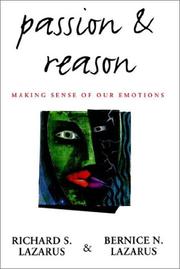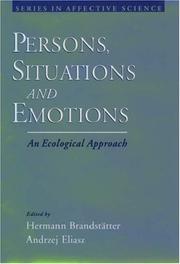| Listing 1 - 10 of 15 | << page >> |
Sort by
|
Book
ISBN: 1009032658 1009032844 1009031244 1316515958 Year: 2023 Publisher: Cambridge, United Kingdom ; New York, NY : Cambridge University Press,
Abstract | Keywords | Export | Availability | Bookmark
 Loading...
Loading...Choose an application
- Reference Manager
- EndNote
- RefWorks (Direct export to RefWorks)
The Cambridge Handbook of Creativity and Emotions provides a state-of-the-art review of research on the role of emotions in creativity. This volume presents the insights and perspectives of sixty creativity scholars from thirteen countries who span multiple disciplines, including developmental, social, and personality psychology; industrial and organizational psychology; neuroscience; education; art therapy, and sociology. It discusses affective processes - emotion states, traits, and emotion abilities - in relation to the creative process, person, and product, as well as two major contexts for expression of creativity: school, and work. It is a go-to source for scholars who need to enhance their understanding of a specific topic relating to creativity and emotion, and it provides students and researchers with a comprehensive introduction to creativity and emotion broadly.
Creative ability. --- Emotions. --- Feelings --- Human emotions --- Passions --- Psychology --- Affect (Psychology) --- Affective neuroscience --- Apathy --- Pathognomy --- Creativeness --- Creativity --- Ability --- Creation (Literary, artistic, etc.)
Book
ISBN: 3839467489 3837667480 Year: 2023 Publisher: Bielefeld : transcript Verlag,
Abstract | Keywords | Export | Availability | Bookmark
 Loading...
Loading...Choose an application
- Reference Manager
- EndNote
- RefWorks (Direct export to RefWorks)
Ob der Sturm auf das Kapitol in den USA, Corona-Proteste oder Verschwörungsglaube - Gefühle sind politisch und zugleich als Speicher von Wahrheit und Lebenserfahrung eine unanfechtbare Entscheidungsinstanz. Doch wie kann man kritisch mit solchen politischen Gefühlen umgehen? Auf Grundlage einer transdisziplinären Lektüre der Debatten zu »Gefühl« und »Kritik« analysiert Frederik Metje Ansätze, die beide Begriffe miteinander in Beziehung setzen. Diese Kritiken politischer Gefühle führen zu einem Ansatz der Selbst-Bildung, durch die es gelingt, sich am eigenen Schopf aus dem Sumpf der politischen Gefühle zu ziehen.
POLITICAL SCIENCE / History & Theory. --- Affect. --- Civic Education. --- Critique. --- Education. --- Emotion. --- Ethics. --- Political Feelings. --- Political Ideologies. --- Political Philosophy. --- Political Science. --- Political Theory. --- Politics. --- Theory of Education.

ISBN: 1280527269 0198024835 1429405872 9780198024835 0195087577 0195104617 9780195087574 0197736440 Year: 2023 Publisher: New York ; Oxford University Press,
Abstract | Keywords | Export | Availability | Bookmark
 Loading...
Loading...Choose an application
- Reference Manager
- EndNote
- RefWorks (Direct export to RefWorks)
Passion and Reason describes how readers can interpret what lies behind their own emotions and those of their families, friends, and co-workers, and provides useful ideas about how to manage our emotions more effectively.
Adjustment (Psychology) --- Affect (Psychology) --- Emotions. --- Accommodation (Psychology) --- Adaptation (Psychology) --- Adapting behavior --- Adaptive behavior --- Coping behavior --- Maladjustment (Psychology) --- Personality --- Psychology --- Adaptability (Psychology) --- Feelings --- Human emotions --- Passions --- Affective neuroscience --- Apathy --- Pathognomy --- Emotions --- Sociological aspects.
Book
ISBN: 3658414499 3658414480 Year: 2023 Publisher: Wiesbaden : Springer Fachmedien Wiesbaden : Imprint: Springer,
Abstract | Keywords | Export | Availability | Bookmark
 Loading...
Loading...Choose an application
- Reference Manager
- EndNote
- RefWorks (Direct export to RefWorks)
In diesem Open-Access-Buch geht es um die Frage, ob Emotionsregulationsprobleme eine Bedeutung für die Depression im höheren Erwachsenenalter haben. Depressionen sind in dieser Altersgruppe weit verbreitet, werden aber häufig nicht adäquat behandelt oder sogar als Teil des natürlichen Alterungsprozesses hingenommen. Ein Grund liegt in dem geringen Wissen um diese Erkrankung. Aus anderen Altersgruppen wissen wir, dass Regulationsprobleme mit Depressivität assoziiert sind. Im höheren Erwachsenenalter ist dieser Zusammenhang nahezu unerforscht. Um diese Lücke zu schließen, wurden Menschen im höheren Alter mit und ohne Depression untersucht. Das Ergebnis: Bei gesunden älteren Menschen hatte Regulationskompetenz einen positiven Einfluss auf das Wohlbefinden und war sogar Schutzfaktor gegen Depressionen. Patient:innen in klinischer Depressionsbehandlung profitierten im Hinblick auf den Outcome ihrer Behandlung ebenfalls von höherer Regulationskompetenz. Allerdings spielte Akzeptanz hier eine überraschende Rolle. Die Untersuchung liefert Hinweise, dass die Förderung emotionaler Kompetenz auch im Alter ein wirksamer Baustein psychotherapeutischer Behandlung sein kann. Die Autorin Nadine Becker-Hingst arbeitet als wissenschaftliche Mitarbeiterin am Institut für Pädagogische Psychologie "Rosa und David Katz" der Universität Rostock. Dort ist sie in der Ausbildung von Lehramtsstudierenden sowie in der Forschung tätig. Daneben befindet sie sich in Ausbildung zur Verhaltenstherapeutin.
Cognitive psychology. --- Emotions. --- Perception. --- Cognitive Psychology. --- Emotion. --- Supraliminal perception --- Cognition --- Apperception --- Senses and sensation --- Thought and thinking --- Feelings --- Human emotions --- Passions --- Psychology --- Affect (Psychology) --- Affective neuroscience --- Apathy --- Pathognomy --- Psychology, Cognitive --- Cognitive science

ISBN: 1280473339 019535057X 1602564132 9780195350579 9780195135176 0195135172 0195302362 9780195302363 9786610473335 6610473331 0197736491 0190285583 Year: 2023 Publisher: Oxford : Oxford University Press,
Abstract | Keywords | Export | Availability | Bookmark
 Loading...
Loading...Choose an application
- Reference Manager
- EndNote
- RefWorks (Direct export to RefWorks)
This text is a social psychology approach to the study of emotion, which presents empirical data using a time sampling technique allowing researchers direct access to phenomenological experiences without the distorting effects of recall.
Emotions. --- Context effects (Psychology) --- Personality. --- Temperament. --- Psychology --- Human beings --- Personality --- Personal identity --- Personality psychology --- Personality theory --- Personality traits --- Personology --- Traits, Personality --- Individuality --- Persons --- Self --- Temperament --- Associations, Contextual (Psychology) --- Context (Psychology) --- Contexts (Psychology) --- Contextual associations (Psychology) --- Contextualism (Psychology) --- Effects, Context (Psychology) --- Feelings --- Human emotions --- Passions --- Affect (Psychology) --- Affective neuroscience --- Apathy --- Pathognomy --- Constitution

ISBN: 1280473037 9786610473038 0195350855 160256406X 9780195350852 0195186176 9780195186178 9780195133592 0195133595 9781280473036 661047303X 0195307984 9780195307986 0197735304 019028532X Year: 2023 Publisher: Oxford ; Oxford University Press,
Abstract | Keywords | Export | Availability | Bookmark
 Loading...
Loading...Choose an application
- Reference Manager
- EndNote
- RefWorks (Direct export to RefWorks)
This work offers a fresh approach to understanding how emotions and stress influence health. Zautra presents a convincing case for understanding our emotions in two dimensions - the pursuit of the positive and defense against the negative.
Clinical health psychology. --- Emotions. --- Stress (Psychology) --- Emotional stress --- Mental stress --- Psychological stress --- Tension (Psychology) --- Mental health --- Psychology --- Diathesis-stress model (Psychology) --- Life change events --- Type A behavior --- Feelings --- Human emotions --- Passions --- Affect (Psychology) --- Affective neuroscience --- Apathy --- Pathognomy --- Health psychology --- Health psychology, Clinical --- Psychology, Clinical health --- Psychology, Health --- Salutogenesis --- Clinical psychology --- Medicine and psychology
Book
ISBN: 3031315472 Year: 2023 Publisher: Cham : Springer International Publishing : Imprint: Springer,
Abstract | Keywords | Export | Availability | Bookmark
 Loading...
Loading...Choose an application
- Reference Manager
- EndNote
- RefWorks (Direct export to RefWorks)
This handbook provides a detailed overview of the emotional, physical, and social implications of anger, aggression, and violence. The book covers the recognition, diagnosis, and evaluation of these areas, aiming to understand the aetiology of these behavioral features to assist with prevention and cure. The book is divided into eight sections: Placing Aggression, Anger, Aggression and Violence In Context Causes and Precipitation of Anger, Aggression and Violence Features of Anger, Aggression and Violence Anger, Aggression and Violence in Defined Disorders and Conditions Physical Measures of Pathology and Insights: Genetics Physical Measures of Pathology and Insights: Non-Genetic Treatments and Therapies Methods and Techniques Handbook of Anger, Aggression, and Violence will be of use for behavioral scientists, psychologists, psychiatric nurses and doctors, neurologists, health scientists, general practitioners, research scientists and all those interested in altered behavior.
Clinical psychology. --- Emotions. --- Personality. --- Clinical Psychology. --- Emotion. --- Personal identity --- Personality psychology --- Personality theory --- Personality traits --- Personology --- Traits, Personality --- Psychology --- Individuality --- Persons --- Self --- Temperament --- Feelings --- Human emotions --- Passions --- Affect (Psychology) --- Affective neuroscience --- Apathy --- Pathognomy --- Psychiatry --- Psychology, Applied --- Psychological tests --- Psicologia clínica --- Emocions --- Ira (Emoció) --- Agressivitat --- Violència --- Personalitat
Book
ISBN: 1009279416 1009279386 1009279408 1009279394 9781009279390 Year: 2023 Publisher: Cambridge, UK : Cambridge University Press,
Abstract | Keywords | Export | Availability | Bookmark
 Loading...
Loading...Choose an application
- Reference Manager
- EndNote
- RefWorks (Direct export to RefWorks)
The years following the 2008 financial crisis produced a surge of political discontent with populism, conspiracism, and Far Right extremism rising across the world. Despite this timing, many of these movements coalesced around cultural issues rather than economic grievances. But if culture, and not economics, is the primary driver of political discontent, why did these developments emerge after a financial collapse, a pattern that repeats throughout the history of the democratic world? Using the framework of 'Affective Political Economy', The Age of Discontent demonstrates that emotions borne of economic crises produce cultural discontent, thus enflaming conflicts over values and identities. The book uses this framework to explain the rise of populism and the radical right in the US, UK, Spain, and Brazil, and the social uprising in Chile. It argues that states must fulfill their roles as providers of social insurance and channels for citizen voices if they wish to turn back the tide of political discontent.
Financial crises --- Social conflict. --- Radicalism. --- Political psychology. --- Emotions. --- Conspiracy theories. --- Psychological aspects. --- Political aspects. --- History --- Feelings --- Human emotions --- Passions --- Psychology --- Affect (Psychology) --- Affective neuroscience --- Apathy --- Pathognomy --- Mass political behavior --- Political behavior --- Political science --- Politics, Practical --- Psychology, Political --- Social psychology --- Extremism, Political --- Ideological extremism --- Political extremism --- Class conflict --- Class struggle --- Conflict, Social --- Social tensions --- Interpersonal conflict --- Sociology --- Crashes, Financial --- Crises, Financial --- Financial crashes --- Financial panics --- Panics (Finance) --- Stock exchange crashes --- Stock market panics --- Crises --- Errors, inventions, etc. --- Psychological aspects
Book
ISBN: 3031242203 303124219X Year: 2023 Publisher: Cham, Switzerland : Springer,
Abstract | Keywords | Export | Availability | Bookmark
 Loading...
Loading...Choose an application
- Reference Manager
- EndNote
- RefWorks (Direct export to RefWorks)
This timely volume provides an up-to-date exploration of the affective profiles model, a person-centered means of understanding the affective system. It presents the etiology underpinning the affective system and compares the model with other existing personality models, such as the Big Five Model, and the Cloninger’s Biopsychosocial Model. Most important, it examines the affective profiles model in relation to well-being, which includes life satisfaction, as well as psychological health. As such, it illuminates the problems of depression, anxiety, and sleep disorders. Based on a wealth of longitudinal, cross-cultural and intervention studies, this book offers a critical view of the affective profiles model that will enrich both further research and clinical practice.
Emotions. --- Personality. --- Difference (Psychology). --- Ethnopsychology. --- Emotion. --- Personality and Differential Psychology. --- Cross-Cultural Psychology. --- Cross-cultural psychology --- Ethnic groups --- Ethnic psychology --- Folk-psychology --- Indigenous peoples --- National psychology --- Psychological anthropology --- Psychology, Cross-cultural --- Psychology, Ethnic --- Psychology, National --- Psychology, Racial --- Race psychology --- Psychology --- National characteristics --- Differential psychology --- Psychology, Differential --- Differentiation (Developmental psychology) --- Personal identity --- Personality psychology --- Personality theory --- Personality traits --- Personology --- Traits, Personality --- Individuality --- Persons --- Self --- Temperament --- Feelings --- Human emotions --- Passions --- Affect (Psychology) --- Affective neuroscience --- Apathy --- Pathognomy --- Emotions --- Afecte (Psicologia)
Book
ISBN: 9783031179136 9783031179129 Year: 2023 Publisher: Cham Palgrave Macmillan
Abstract | Keywords | Export | Availability | Bookmark
 Loading...
Loading...Choose an application
- Reference Manager
- EndNote
- RefWorks (Direct export to RefWorks)
This book proposes a comprehensive discussion of the issue of linguistic feeling, the subject’s metalinguistic capacity to intuitively apprehend the normative – lexical, syntactic, morphological, phonological… – dimensions of a definite language he or she is acquainted with. The volume’s twelve contributions aim to revisit a concept that, through a fluctuating terminology (“Sprachgefühl,” “sentiment de la langue,” “linguistic intuitions,” etc.), had developed, since the late 18th century, within a variety of cultural contexts and research traditions, and whose theoretical, epistemological, and historical ins and outs had not been systematically explored so far. Beginning with a long opening chapter, the book consists of two parts, one tracing the multifaceted approaches to linguistic feeling from Herder to Wittgenstein, and one offering a representative overview of the debates about the issue at stake in current linguistics and philosophy, while addressing the question of the place of metacognition, normativity, and affectivity in language processes.
Psycholinguistics --- Philosophy of language --- Linguistics. --- Philology. --- Language acquisition. --- Language and languages—Philosophy. --- Emotions. --- Knowledge, Sociology of. --- Theoretical Linguistics / Grammar. --- Languages. --- Language Acquisition and Development. --- Philosophy of Language. --- Emotion. --- Sociology of Knowledge and Discourse. --- Knowledge, Theory of (Sociology) --- Sociology of knowledge --- Communication --- Knowledge, Theory of --- Public opinion --- Sociology --- Social epistemology --- Feelings --- Human emotions --- Passions --- Psychology --- Affect (Psychology) --- Affective neuroscience --- Apathy --- Pathognomy --- Interpersonal communication in children --- Linguistic science --- Science of language --- Language and languages --- Language And Languages --- Language Arts & Disciplines
| Listing 1 - 10 of 15 | << page >> |
Sort by
|

 Search
Search Feedback
Feedback About UniCat
About UniCat  Help
Help News
News